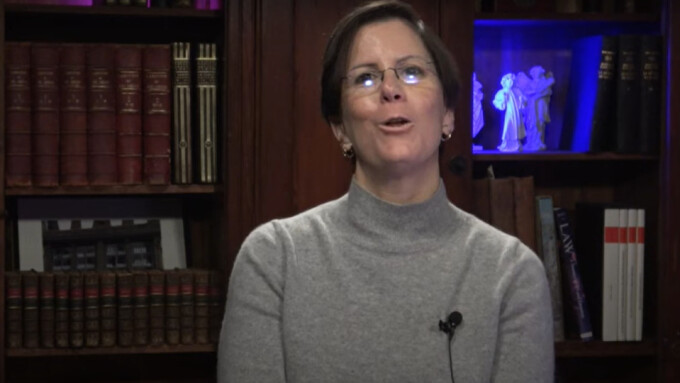GENEVA — Fervent anti-sex work activist Reem Alsalem, a special rapporteur on violence against women and girls at the United Nations Human Rights Council, asserted in an interview this week that pornography represents a “gross human rights violation.”
Alsalem, who last year wrote a report for the Council titled “Prostitution and Violence Against Women and Girls,” told the European Center for Law and Justice (ECLJ) that pornography constitutes “filmed prostitution.”
“It has the same perpetrators of violence,” she says in the interview. “The same exploitation, the same consequences in terms of all forms of violence inflicted on women and girls, in terms of being exploited by pimps, in terms of also having immense harmful impact on all society, including, I would say, men and boys, younger girls, and harmful to gender equality overall in society.”
She goes on to claim — with no supporting evidence — that the vast majority of pornography is grotesque, degrading and violent.
“Normalizing consuming pornography has become an issue that is an epidemic as well, on global proportions,” she adds.
As XBIZ reported, sex worker groups and activists traveled to Geneva last year to denounce Alsalem’s stigmatizing report, in which she rejected the term “sex work.”
“The term wrongly depicts prostitution as an activity as worthy and dignified as any other work,” Alsalem wrote. “It fails to take into account the serious human rights violations that characterize the prostitution system and ‘gaslights’ victims and their experiences.”
In the interview with ECLJ, Alsalem claims that the “glamorization” of porn and the “discourse that it is empowering” lead to the exploitation of women. She also argues that free speech protections should not apply to pornography, erroneously claiming that watching porn is a common precursor to physical violence.
“Often the consumption of pornography leads to violence in real life,” she contends, again without providing evidence.
Performer and Free Speech Coalition Industry Relations Advocate Lotus Lain, who spoke in front of the Council in 2023 about sex workers' rights, took issue with Alsalem's characterization.
"This type of dismissive statement from people who lived a sheltered life of diplomacy, higher education and access to a type of job security that many of us in the sex trade are not afforded really speaks to the nature of their bias," Lain told XBIZ. "They never agree to meet with anyone that has lived experienced outside of the trauma porn narrative of the sex industry that they would like to push.
"I would implore the UN special rapporteur to make time to actually meet with, rather than avoid and listen to, rather than talk over, those of us in the sex industries that have used our overexposed platforms to champion the voices of the marginalized and challenge existing power structures that do more harm to the so-called women she purports to have concern for."
Speaking last year in response to Alsalem’s report, sex workers’ rights activist Kholi Buthelezi of the South Africa-based Sisonke National Sex Workers Rights Movement strongly countered Alsalem’s position that anyone working in prostitution or pornography is automatically being exploited.
“Saying we are ‘commodities of men’ is hurtful,” Buthelezi said. “It confuses trafficking with sex work and uses the code of feminist women and girls.”
Buthelezi condemned Alsalem’s attitude as demeaning and warned that it is actively dangerous to sex workers.
“We need the feminist movement to come on board,” she said. “Our lives continue to be in danger.”







